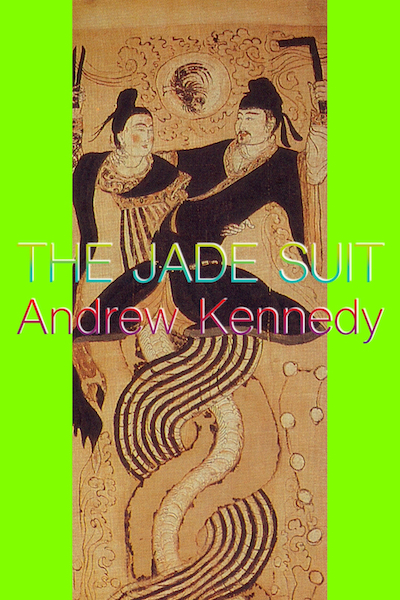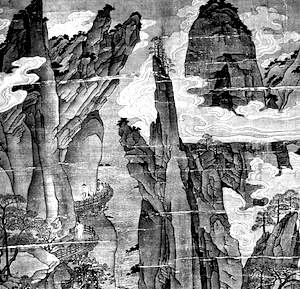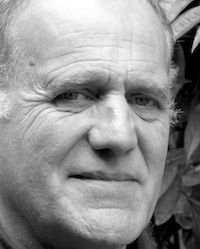

ISBN 9780954483173 Gravity Publishing, UK;
Published:
2003; trade paper; 152mm x 228mm; 92 pages;
10 illustrations; subject: Poetry, Taoism,
History; general readership. Also available as an ebook.
The Jade Suit is the story of two lovers as much as it is about Taoism and China. It spans Chinese history from Shih Huang Ti, the first emperor, to recent events, while themes, both pastoral and bureaucratic, are repeated in different guises.
Between each of the seven sections, ideas from the first verse are recapitulated and developed to give a sense of the widening cycles of history, and in particular, the way that Taoist rebellions have come and gone through the ages, up to and including the crushing of the recent rebellion centred on T’ien-an Men (Tiananmen) Square.
The author writes, "...I have tried to unify the whole structure with repeated rhythms and melodies, and I have also tried, within the constraints of English, to illuminate the methods and styles of the Chinese poetry and discourses with which I am familiar. By this method I hope to enter, or at least to touch upon, the mind that created the original device for ensuring immortality, a jade suit..."
Background
"...An exhibition of Chinese art and artefacts came to London in the early 1970s. It included a clay mannikin of a soldier recently unearthed from the site of a long lost tomb complex. This mannikin was one of a vast army of life-like statues buried around 210 BC to guard the tomb of the first Emperor of China, Shih Huang Ti. But the centre piece of the exhibition was an extraordinary mummy. This mummy was one of a pair found in a cave in central China. The two bodies were of a minor noble prince, Lou Sheng, and his wife Tou Wan, buried in the 2nd century AD during the Han Dynasty. They had been dressed in suits of small jade tablets wired together with fine gold wires. These mummies proved not to be unique: others have been discovered since...
...A few years later, when I began my study of Taoism, my mind kept returning to the image of that jade suit. I used it as a starting point for this long poem that I began in 1980 and developed over the next half-dozen years.

“And of your fortification I saw only
its path paced out.
Fashion it became or was said
to have a village or a court represented at the wall -
Priests and poets bent from their deliberate elaborations;
criminals and slaves with their
more difficult festivities.
“And garden walks and audiences
slow as the moon;
Lou Sheng's measured compliments; an archer stung by love
painting his words on my silks;
child-birth, child rearing and age
from the far world's end, companionably brought.
“Ah death! No racing cup, no pearled wine, no poem in mind.
The age was never far -
as near as weather and less remarkable. And beyond?
Man's isolated mountains - all pathways and destiny:
that narrow neck to the vessel of events.
Constriction was my beauty,
from the outside without pain.
Men expected all the agonies theirs.
I was princess and thirteen.
Such changes were wrought in me.”
Soil falls from a robber's spade,
daylight reflects around the tomb.
Huang Ti is humorously amazed
at these awed hands striking dust from dead estate.
Each jewel he knows and disregards;
each precious figurine
he lets, with laughter, go.
Mercury, emerald, gold and jade - each thief will find
repayment in the sale is handing fears on.
An ageless currency anticipates the ghost.
Huang Ti moves, is taken by the sun.
Age upon age ascends the hill.
Flat boat on a broad river, reeds by the bank, a man,
standing on his oar,
walks the water and moves slowly on.
Irrigating arm dips into the sleep of day.
A glittering stroke from the stream expires in soil.
A tree stands and shades another.
Dust blows faintly from a distant figure.
Laughter comes in the sleep of ages
like peaceful enterprise.
If the path can be left then it is not the path.

Andrew Kennedy is an independent researcher into consciousness
and the philosophy of science, the founder of the Chronolith Project
and originator of the Chronolith experiment (to which the Cosmology of
People refers). He studied Chemistry at Edinburgh University and later
studied Chinese, Daoism and Daoist medicine, translated two Chinese
philosophy classics and wrote an original tract on the evolution of
human personality types, published in 2009 (Essential Personalities),
and currently writes about the prospects of interplanetary travel.
He also designed games and held a patent in a switching device. He is a Fellow of the BIS and a member of the Society for Social and Conceptual Issues in Astrobiology (SSoCIA).
He also designed games and held a patent in a switching device. He is a Fellow of the BIS and a member of the Society for Social and Conceptual Issues in Astrobiology (SSoCIA).
©2020
The Cosmology of People